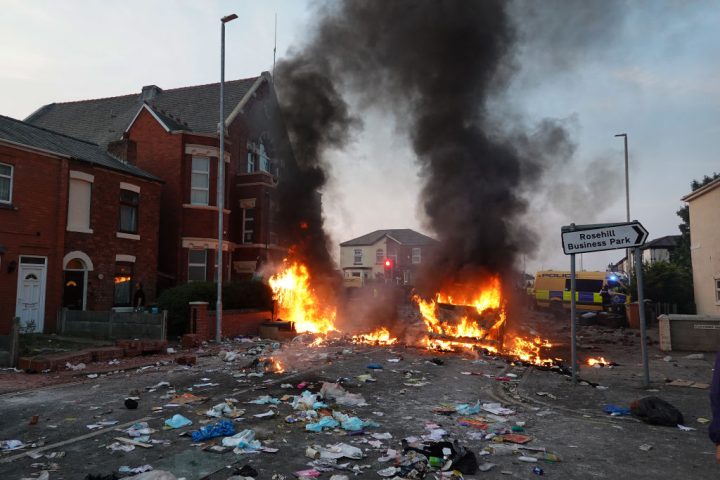Just a month into the Labour ascendancy and its first major political crisis has already taken shape. It is not the looming tax-raising Budget Rachel Reeves is preparing in contravention of assurances made during the election campaign about her party’s plans being fully funded. It is instead something much more visceral and basic: a breakdown in law and order.
On the first BBC Question Time programme after the election, Andrew Marr gave his thoughts on what the new Starmer administration would mean. ‘For the first time in many of our lives, actually Britain looks like a little haven of peace and stability,’ he declared. He was referring to parliamentary stability – but outside of Westminster, things haven’t looked very stable of late.
Starmer is in acute danger of alienating millions of voters
We have had the Harehills riot in Leeds; the attack on police at Manchester Airport and a subsequent intimidatory protest in support of the instigators outside Rochdale police station; disturbances in Whitechapel, East London linked to events in Bangladesh; a very serious attack on a British soldier in uniform in Kent; the gruesome Southport murders followed by mini-riots in that town and in Hartlepool and London; aggressive demonstrations in Newton Heath in Manchester and in Aldershot connected to local unhappiness about accommodation for Channel migrants; a spate of stabbings in London notable even by the dismal standards of our knife-happy capital; gangs of youths from out of town battling each other with machetes on the sea front at Southend and as many as 35 protest planned across the country this weekend.
Through most of this period, Yvette Cooper has responded mainly with an earnest furrowed brow and concerned owlish eyes, reminding those of us of a certain age – my age – of the notoriously hesitant Coronation Street character Mavis Wilton (‘I just don’t really know, Derek’).
On Thursday, robocop finally arrived on the scene in the shape of the Prime Minister reprising his response to the 2011 summer riots, which took place when he was Director of Public Prosecutions. Back then, Sir Keir Starmer spearheaded fast summary justice that got a grip on events by jailing perpetrators and signalling to potential copycat offenders that they could be next.
This time he was in similar no-nonsense mode, declaring directly at a specially convened Downing Street press conference: ‘I will not permit, under any circumstances, a breakdown in law and order on our streets.’
He was right to make this clear. There is almost nothing so terrifying for citizens as the realisation that law and order is in abeyance and that criminally-minded people in their neighbourhoods have cottoned on to this.
And yet, Starmer and Labour now have a very major problem. It is, to put things at their mildest, that a perception is growing that Labour is presiding over a two-tier response to disorder. Matt Goodwin, an academic and author, made this point recently. ‘It’s about allowing double-standard policing where it’s okay to protest if you’re anti-Israel and anti-West. But you can’t protest if you’re from the white majority, because then you’re considered to be a far-right extremist. That’s what’s frustrating a lot of people in Britain today: that sense of imbalance.’
For example, after the Manchester Airport altercation, the local Labour MP Paul Waugh met with the family of the men involved. Those men were at the time being presented as innocent victims of police brutality after one of them was kicked in the head by a police officer. ‘It is clear they are deeply traumatised by what happened…This is a hardworking Rochdale family, some of whose members are police officers themselves, and are therefore particularly shocked at what they have witnessed,’ he declared.
And in the wake of the Harehills riot (which Rod Liddle writes about here), Labour-run Leeds city council held a meeting with representatives of the Roma community at which it promised an urgent review into the child protection case that sparked it. ‘The Romanian and Roma community have played a fantastic role in the community and have contributed much to the diversity and richness of Harehills,’ said an official statement from the council.
It is an interesting contrast that the disorder of this week followed the failure of the state to protect children, while the Harehills riot began as protest by a minority community against the state trying to deliver child protection. Yet there is no Labour panjandrum on hand to meet with working-class communities at the end of their tether and reduced to rage (audible when Keir Starmer was heckled earlier this week)
Yes, it has been an ugly week. Yes, it is good that police did not run away from troublemakers in Southport, Hartlepool or Whitehall, as they did at one point in the face of the street violence in Leeds.
But by focusing almost entirely on just one source of disorder, Starmer is in acute danger of alienating millions of voters in scores of working class constituencies that Labour won back by default amid the Tory general election collapse. As the Reform MP Lee Anderson has warned him: ‘You’re not reading the room.’







Comments